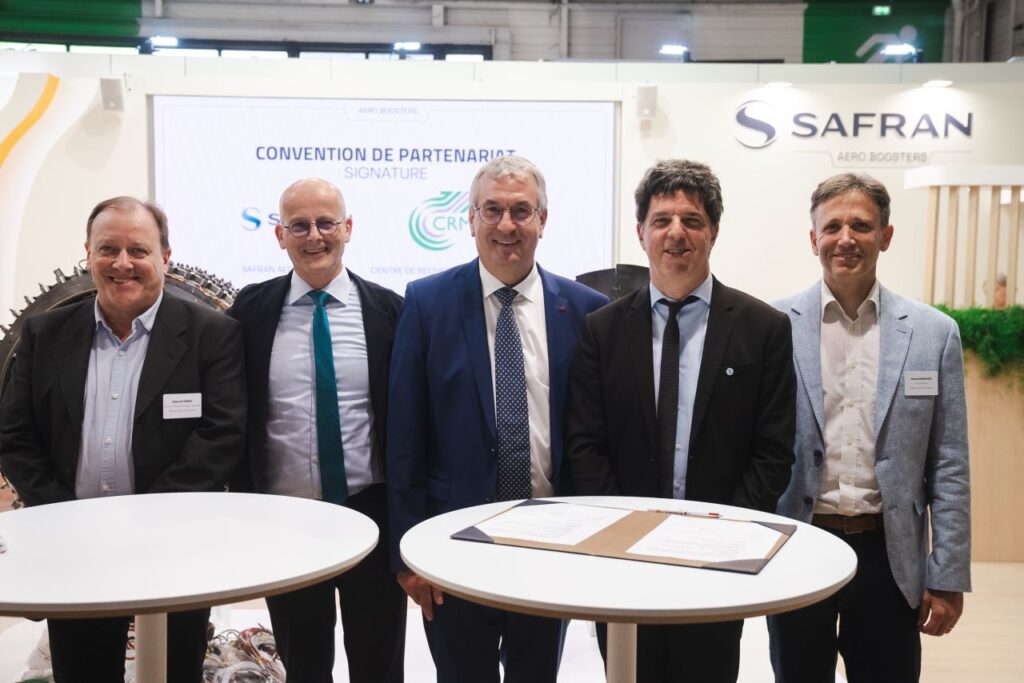CRM Group highlighted in Trends-Tendances for its key role in Belgium’s aerospace and defense revival

CRM Group has been prominently featured in a recent article by Trends-Tendances, Belgium’s leading economic and business publication, which focused on the strength and interconnectivity of Wallonia’s aerospace and defense ecosystem. This recognition highlights CRM Group’s central role in supporting industrial innovation, technological sovereignty, and reindustrialisation in strategic sectors such as aerospace and defense.
A strategic contribution to European reindustrialisation
One of the most remarkable examples cited in the article is CRM Group’s collaboration with Safran Aero Boosters, specifically in the development of the Safran Blades factory in Marchin, Belgium. This high-tech facility, now operational, is the only site in Europe capable of forging titanium compressor blades for next-generation aircraft engines (LEAP series).
This manufacturing step had previously only been mastered in Russia, China, or Israel. However, faced with growing geopolitical tensions and the need for industrial sovereignty, Safran decided to bring this critical process back to Europe — and CRM Group was instrumental in making it happen.
“Forging titanium compressor blades is an extreme technical challenge,” explains Joeri Neutjens, our CEO. “We supported Safran in the development of their new production line. The project ticks all the right boxes: reindustrialisation, innovation, and local anchoring.”
This collaboration demonstrates CRM Group’s ability to translate complex materials science and process engineering into industrial reality for high-stakes applications.
From metallurgy to multi-sectoral innovation
Founded in 1948, CRM Group has deep roots in the Belgian steel and metallurgy industry. But the center underwent a strategic transformation six years ago, under the leadership of Joeri Neutjens, to address the decline of its traditional industrial base following the restructuring of ArcelorMittal.
“We lost a significant part of our industrial customer base,” Joeri Neutjens recalls. “So we launched a diversification strategy targeting new sectors — including aerospace, defense, and green technologies — and it has paid off.”
Today, CRM Group employs over 300 people and operates on a budget of around 50 million euros, of which 80% comes directly from the industrial sector. The center now offers expertise in advanced manufacturing, circular economy, CO₂ capture, surface engineering, thermal management, and more — all highly relevant to the needs of aerospace and defense actors.
Backed by WINGS: Walloon Innovation for the Green Skies
CRM Group’s strategic repositioning was supported by the WINGS programme (Walloon Innovation for the Green Skies) — a major regional initiative launched during the COVID-19 crisis to sustain research and innovation in the aerospace sector.
Through this framework, CRM Group collaborates closely with key industrial players such as Safran Aero Boosters, Sonaca, Thales, as well as numerous SMEs and Wallonia’s aerospace competitiveness cluster Skywin.
WINGS has mobilized over €100 million in R&D funding, facilitating projects that contribute to a greener, more sovereign European aerospace sector. CRM Group is proud to be one of the key contributors to this collective effort.
A growing presence in space, defense, and beyond
Today, aerospace represents between 5% and 10% of CRM Group’s total activity, but this share is expected to grow significantly as new programs and collaborations develop.
Recent milestones include the contribution to the inaugural flight of Ariane 6, where CRM Group provided advanced thermal protection components to shield satellite electronics from extreme temperature variations.
CRM Group also plays an active role in defense innovation, energy systems, and next-gen manufacturing technologies, positioning itself as a cross-sectoral R&D hub for industrial resilience and sustainable transition.
Looking forward
CRM Group’s journey from metallurgy to multi-sectoral excellence shows how a research center can adapt, grow, and become a key enabler of European industrial strategy. Through its partnerships, capabilities, and people, the center helps transform innovation into tangible outcomes — supporting industrial sovereignty, environmental responsibility, and technological leadership.
“We are committed to creating value with and for industry,” concludes Joeri Neutjens. “Whether it’s aerospace, defense, or circular economy, our strength lies in our ability to build bridges between science, technology, and production.”
Interested? Contact us on
